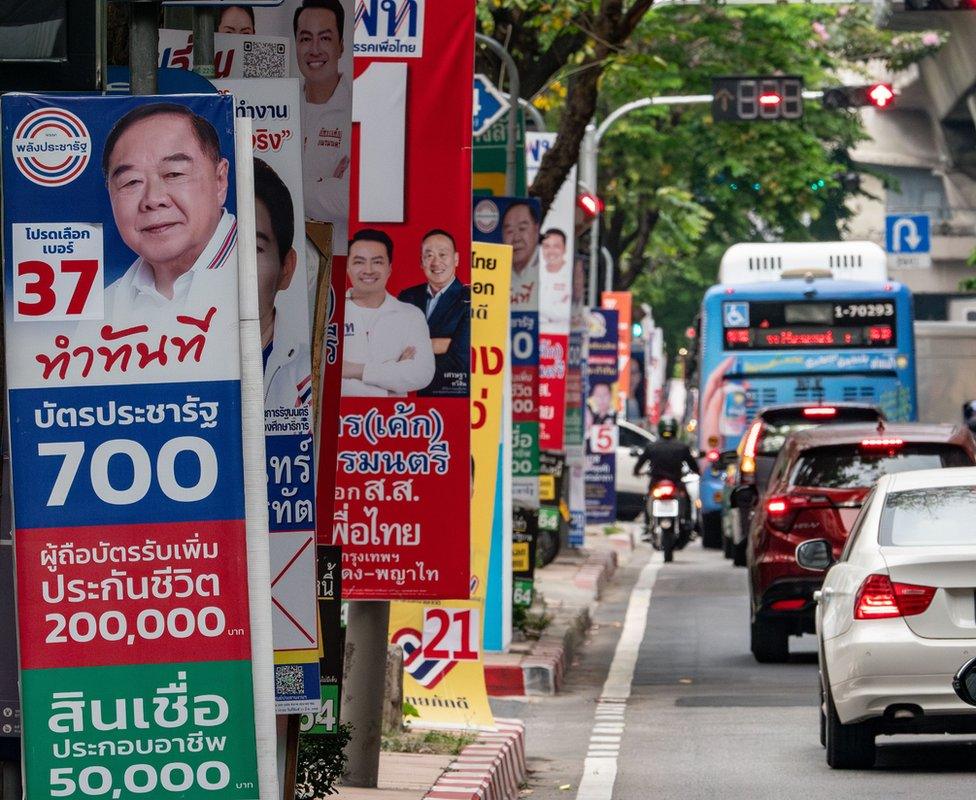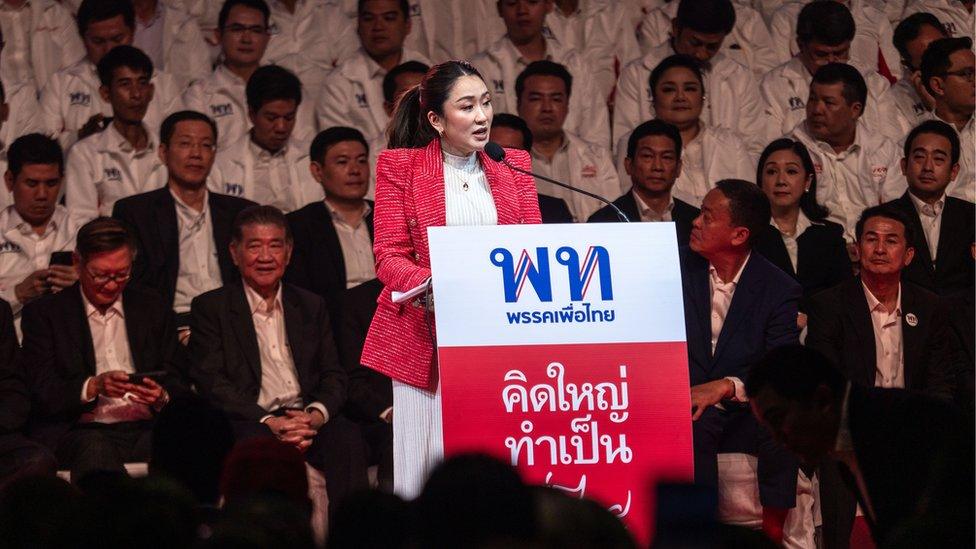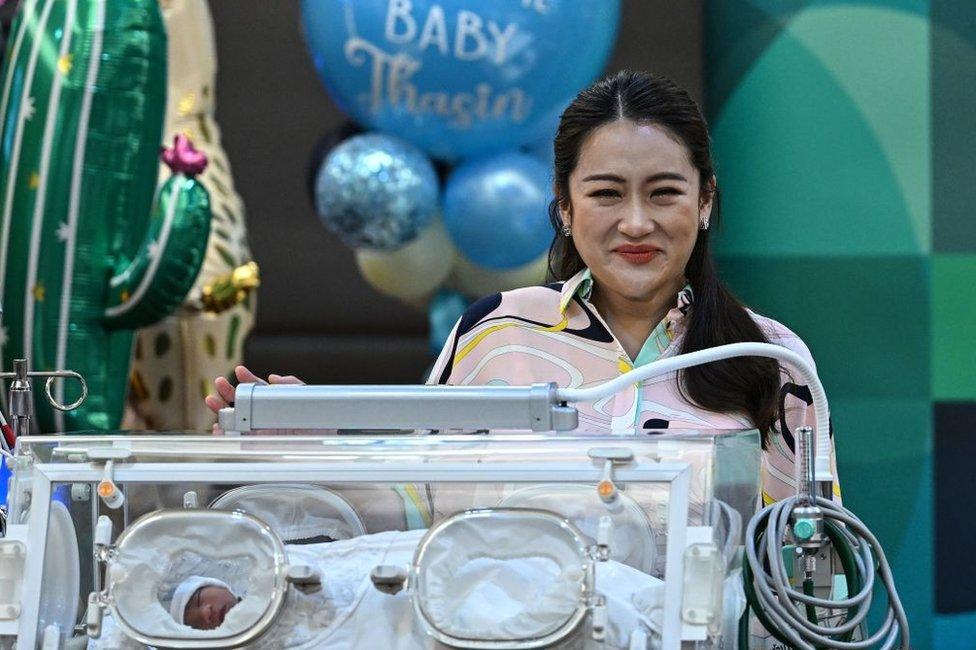Thailand election: The party they can't stop winning
- Published

Election posters in Bangkok - the vote presents Thailand with a big choice about its future
For the past few weeks an irresistibly catchy tune has been playing in neighbourhoods across Thailand, from campaign trucks sent out by the Pheu Thai party, the frontrunner in this Sunday's general election.
"A landslide for Pheu Thai, in all areas, so the lives of the people can be better," it goes, urging voters to give it a thumping victory.
That Pheu Thai (For Thais) is so far ahead of all its rivals is remarkable. This is despite all the efforts made over the past 17 years to weaken it, and to eliminate the influence of Thaksin Shinawatra, the telecoms billionaire who founded its first incarnation, Thai Rak Thai, in 1998.
Mr Thaksin's government was deposed by a military coup in 2006, and Thai Rak Thai was dissolved. He has been living in exile since being prosecuted in what his family says are politically-motivated charges. A successor party was also dissolved by the courts in 2008, and in that year two of its prime ministers were disqualified.
After Mr Thaksin's sister Yingluck won a landslide in the 2011 election, she too was disqualified by the courts, and her government ousted by a second coup. She is also living in exile.
At the last election in 2019 Pheu Thai won far more seats than any other party, but was prevented from forming a government.

Paetongtarn Shinawatra says the country is about more than coups
Now the polls show Pheu Thai on track once again for victory. The Shinawatra family has put forward Thaksin's youngest daughter Paetongtarn to lead the campaign, which she has done even in the last stages of pregnancy, eliciting admiration and sympathy.
It has once again run a slick, well-marketed campaign, making a range of appealing offers to the electorate, from a substantial increase in the minimum wage, to a promise of a 10,000 baht ($300; £240) digital wallet for every adult to be spent locally.
"I think after eight years the people want better politics, better solutions for the country than just coup d'etats," Paetongtarn told the BBC. "They are seeking policies that will help their lives."

Paetongtarn had a baby on 1 May - and was back campaigning within days
"For many years no other political force has been able to offer an alternative to Pheu Thai, in terms of policy offerings, in terms of charisma, in being able to communicate directly with the people", says Siripan Nogsuan Sawasdee, a political scientist at Chulalongkorn University, who has been making a study of the party's appeal.
"And because the last coup d'etat resulted in two military-backed governments which failed miserably in economic performance and in dealing with the Covid pandemic, the popularity of its main opponent Pheu Thai remains high."
Ms Siripan identifies what she calls the three Ps as the key to political success in Thailand; policies, personalities and patronage networks, and political values.
Pheu Thai has always been very strong on the first. Thai Rak Thai was a pioneer in this region in running a modern, manifesto-based campaign in its first election campaign in 2001. It offered policies like universal healthcare and village-based micro-credit schemes which directly benefitted rural and low-income communities. It won the Shinawatra family what has proved to be unbreakable loyalty from some of Thailand's largest vote banks.
On the second, Pheu Thai has built up an extensive network of local power-brokers, who are very influential in maintaining its popularity and getting the vote out. By contrast the two main conservative parties, formed by the last coup-leader Prayuth Chan-ocha and his allies, are relatively new, and do not have such strong local networks.
On the third, Pheu Thai has always successfully portrayed itself both as the party which looks after little people, and which champions democracy, of governments through elections. And that is its main pitch today. If you want an end to conservative, military-backed rule, it says, we are your best choice.
But this time it is being outflanked on political values by a more radical and youthful party, Move Forward, which is calling for profound changes to Thailand's power structures.
It wants to stop the military from intervening in politics, to limit its budget, end conscription, and even talks about making the monarchy more accountable. It has pledged never to form a coalition with one of the military-aligned parties, showing up Pheu Thai's evasiveness on this issue.
Some observers believe Move Forward's growing popularity could eat into Pheu Thai's votes, although the younger party's support is spread across the country, rather than in certain areas, disadvantaging it in a system where 80% of the seats are elected on a first-past-the-post basis.
Pheu Thai is losing its policy edge too, as nearly every main party is now making a crowd-pleasing financial offering to the voters, neutralising the populist appeal that has been the key to Pheu Thai's long run of election wins.
"Especially for the younger generation, Thaksin's legacy of policy delivery in the past does not resonate," says Siripan from Chulalaongkorn. "And don't forget there will be four million first-time voters in this election. Pheu Thai's image as the default anti-military party is facing a real challenge from Move Forward.
"But I still believe Pheu Thai will win by a large margin. It still has the second P, the patronage networks through its candidates in the north and north-east, where Move Forward, as the newer party, has not established these kinds of connections."
If the predictions of the opinion polls hold, and both Pheu Thai and Move Forward perform well enough to ensure they have a substantial majority of the 500 seats in the lower house, the big question is whether they will be allowed to form a government.
The military-drafted constitution allows 250 senators, all appointed by the junta that seized power in 2014, to join the vote on the choice of the next prime minister. The pliant courts could once again be deployed to dissolve one or both of the reformist parties.
Thailand will then be confronted with a choice. Should it stick to the old, authoritarian playbook, which sees election results as optional, rather than essential factors in who holds power?
Or should it break out of the cycle of coups, party dissolutions and street violence which have plagued the country for two decades?

Read more of our coverage on Thailand
